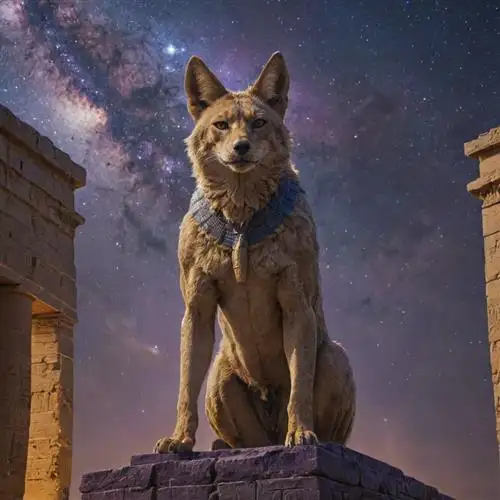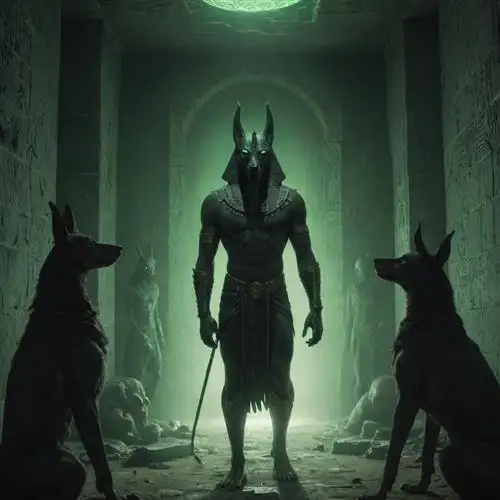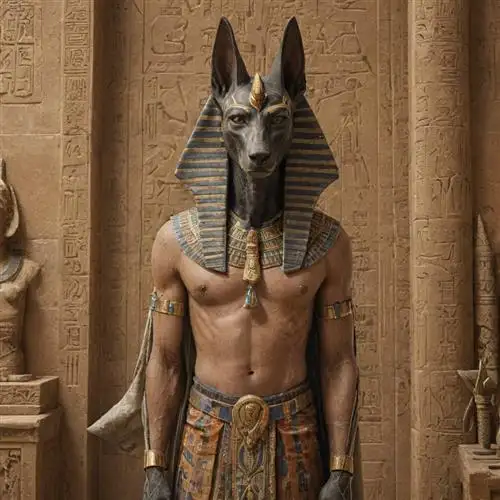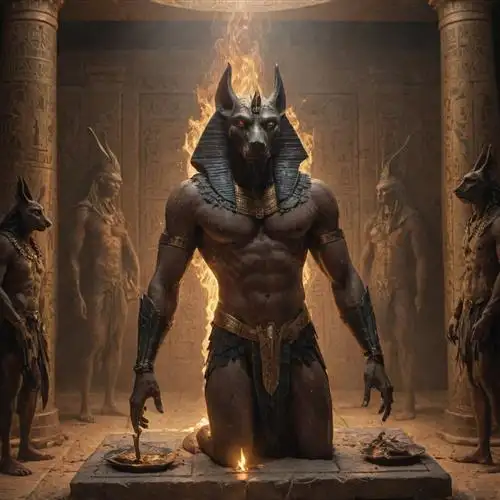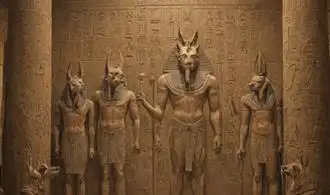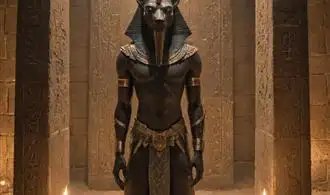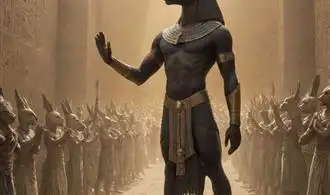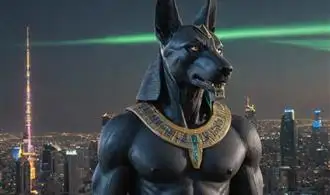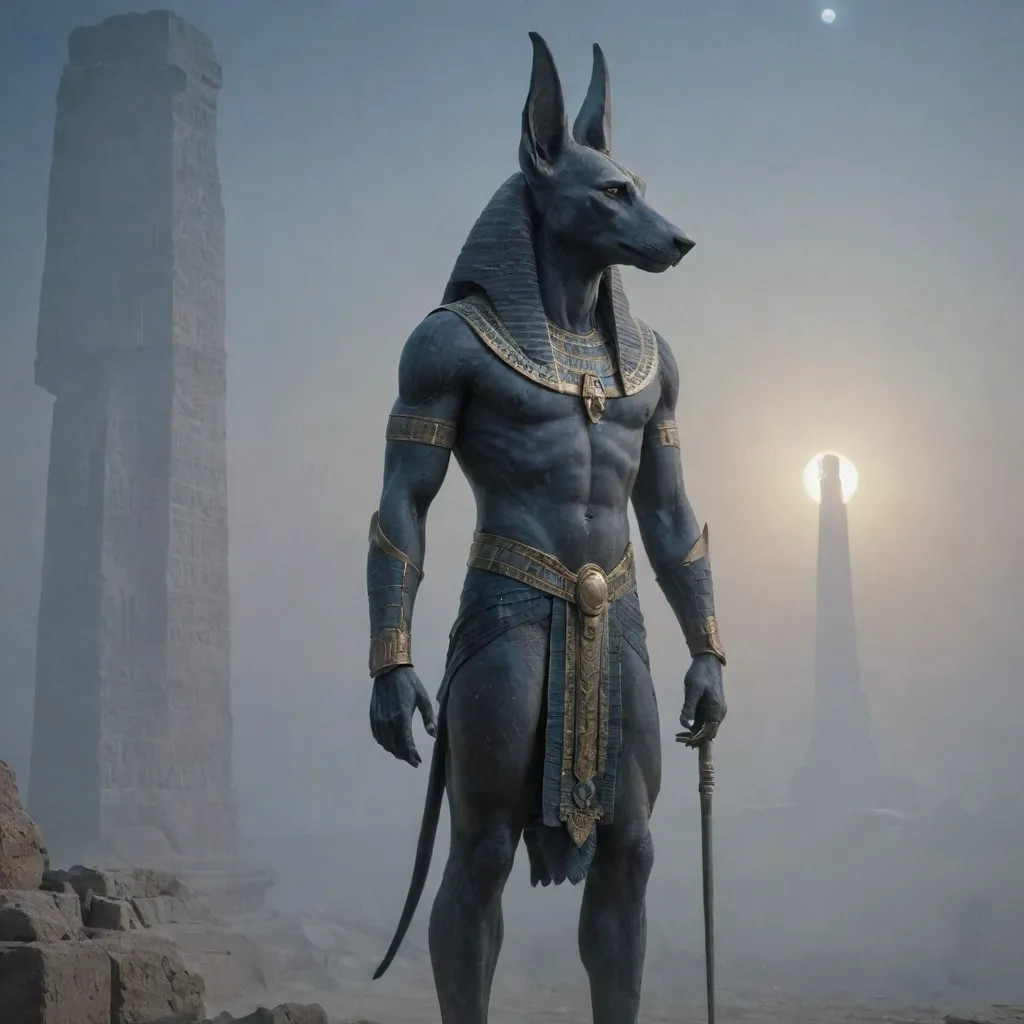
The Significance of the Jackal Head
Anubis, the ancient Egyptian god, is often depicted with the head of a jackal, a distinct and powerful symbolic representation. This jackal-headed deity holds immense significance within the rich tapestry of Egyptian mythology and belief systems. To truly unlock the secrets of Anubis symbolism, understanding the profound meaning behind this iconic jackal head is crucial.
The jackal, a cunning and adaptable canine species native to the Egyptian deserts, was revered for its sharp senses and ability to navigate the harsh environments. In the ancient Egyptian mindset, the jackal embodied the qualities of a keen observer, a protector of the dead, and a guide through the afterlife. Anubis, as the jackal-headed god, was entrusted with these pivotal responsibilities, making the jackal head a symbol of his divine authority and connection to the realms beyond the living.
Moreover, the jackal head represents Anubis's role as the gatekeeper of the underworld, responsible for the mummification process and the safe passage of the deceased into the afterlife. The jackal's acute sense of smell and nocturnal habits were seen as essential attributes for this sacred duty, as Anubis would guide the soul through the labyrinth of the underworld, ensuring a successful transition to the next life.
Beyond the practical associations, the jackal head also holds deep symbolic and metaphorical significance. The jackal, with its ability to thrive in the desert environment, was seen as a symbol of transformation, rebirth, and the cyclical nature of life and death. Anubis, as the jackal-headed god, was thus imbued with the power to facilitate the transformation of the deceased, guiding them through the process of death and into the afterlife.
The jackal head of Anubis also represents the duality of his role, as he was tasked with both the preservation of the dead and the judgment of their souls. The sharp, predatory features of the jackal head signify Anubis's ability to discern the true nature of the deceased, weighing their actions and worthiness for eternal rest.
Anubis and the Afterlife
Anubis, the jackal-headed deity, is deeply intertwined with the ancient Egyptian conception of the afterlife. As the god of mummification and the protector of the dead, Anubis played a crucial role in guiding the deceased through the treacherous journey to the afterlife. Understanding the symbolic significance of Anubis and his connection to the afterlife can provide invaluable insights into the beliefs and practices of ancient Egyptian culture.
The primary role of Anubis in the afterlife was to oversee the process of mummification. As the god responsible for embalming and preparing the dead for their eternal resting place, Anubis ensured that the physical body was preserved and ready for the next stage of the journey. This meticulous process was essential, as the ancient Egyptians believed that the soul could not thrive in the afterlife without a well-preserved physical form.
Beyond the act of mummification, Anubis also played a crucial role in the judgment of the dead. In the famous weighing of the heart ceremony, Anubis would guide the deceased before the god Osiris, who would preside over the judgment. Anubis would carefully weigh the heart of the deceased against the feather of Ma'at, the goddess of truth and justice. If the heart was found to be pure and righteous, the individual would be granted access to the afterlife. Conversely, if the heart was deemed unworthy, the soul would be condemned to eternal damnation.
Anubis's presence in the afterlife was not limited to the judgment of the dead; he was also believed to be a protector and guide for the deceased. As the god who ushered the dead into the afterlife, Anubis was believed to accompany the soul on its journey, ensuring safe passage through the treacherous underworld and providing aid and comfort along the way.
The symbolism associated with Anubis in the afterlife is rich and multifaceted. The jackal-headed deity was often depicted sitting on the threshold between the world of the living and the dead, symbolizing his role as the gatekeeper to the afterlife. Additionally, the black color of Anubis's skin was believed to be representative of the mummified body, as well as the fertile black soil of the Nile River, which was seen as a symbol of regeneration and rebirth.
Anubis as the Embalmer
Anubis, the ancient Egyptian jackal-headed god, played a vital role in the funerary rites and embalming process of the deceased. As the god of the dead and the embalmer, Anubis was responsible for the crucial task of preparing the body for its journey into the afterlife. This profound responsibility granted Anubis a significant position in the Egyptian pantheon, as the successful preservation of the deceased was essential for their transition to the next realm.
Anubis's role as the embalmer was multifaceted, encompassing various aspects of the mummification process. He was responsible for overseeing the extraction of the internal organs, which were then placed in canopic jars for preservation. This delicate procedure required great skill and precision, as any misstep could jeopardize the integrity of the body and the deceased's chances of a successful afterlife.
Furthermore, Anubis was tasked with wrapping the body in linen bandages, a process that was imbued with symbolic meaning. The wrappings not only protected the body but also served as a metaphor for the transformation of the deceased, from mortal to immortal. Anubis would painstakingly ensure that every inch of the body was covered, leaving no part exposed to the elements or potential threats.
The embalming process overseen by Anubis was a sacred and meticulous ritual, infused with deep symbolism and reverence for the deceased. The jackal-headed god was responsible for performing the ritual opening of the mouth, a ceremony that was believed to restore the deceased's senses and allow them to partake in the offerings and sustenance of the afterlife.
Anubis's role as the embalmer was not limited to the physical preparation of the body. He was also believed to be present during the weighing of the heart ceremony, where the deceased's heart was weighed against the feather of Ma'at, the goddess of truth and justice. This critical moment determined whether the individual was worthy of entering the afterlife, with Anubis playing a crucial role in facilitating this judgment.
The Scales of Judgement
The Scales of Judgement, a central aspect of Anubis symbolism, hold profound significance in ancient Egyptian mythology. As the deity responsible for guiding the dead through the afterlife, Anubis played a pivotal role in the process of judgement, where the soul's worthiness was determined. The Scales of Judgement, often depicted in funerary art and texts, represented the weighing of the heart against the feather of Ma'at, the goddess of truth and justice.
In this ritual, the deceased's heart was placed on one side of the scales, while the feather of Ma'at was placed on the other. This symbolic act represented the balance between the individual's actions and the eternal principles of truth and righteousness. The god Anubis, with his jackal-headed form, presided over the weighing, ensuring the process was carried out with the utmost fairness and impartiality.
The outcome of this judgement held profound consequences for the soul. If the heart was found to be lighter than the feather, it signified the individual had lived a righteous life, and their soul would be granted access to the afterlife. Conversely, if the heart was heavier, it indicated the soul had committed transgressions during their earthly existence, and they would be denied passage to the afterlife, facing eternal punishment or annihilation.
The significance of the Scales of Judgement extended beyond the individual. They represented the fundamental belief in the Egyptian cosmological order, where justice, truth, and balance were essential for the well-being of the entire society and the cosmic harmony. The act of weighing the heart symbolized the importance of moral and ethical conduct, as well as the consequences of one's actions in both the earthly and the spiritual realms.
Anubis and the Guardian of Cemeteries
Anubis, the jackal-headed deity, was revered in ancient Egyptian mythology as the guardian of cemeteries and the protector of the dead. This enigmatic figure played a crucial role in the complex rituals and beliefs surrounding death and the afterlife. Understanding the symbolism and significance of Anubis can unlock a deeper appreciation for the ancient Egyptian worldview and the profound reverence they held for this divine intermediary.
As the guardian of cemeteries, Anubis was responsible for the preparation and mummification of the deceased. His role was to ensure the safe passage of the soul from the mortal realm to the afterlife. The jackal-like appearance of Anubis was not merely a symbolic representation but a reflection of his close association with the desert, which was seen as the realm of the dead in ancient Egyptian belief. The jackal was a common sight in the arid landscape, often scavenging near burial sites, further reinforcing Anubis's connection to the realm of the departed.
Anubis's primary responsibility was to oversee the crucial process of mummification, a practice that was essential for the preservation of the physical body and the safeguarding of the soul's journey. The mummification ritual, which could take up to 70 days, was a complex and meticulous process that involved the removal of internal organs, the drying of the body, and the wrapping of the corpse in linen. Anubis was believed to be present during this ritual, ensuring the proper preparation of the deceased and the protection of the soul.
In addition to his role as the guardian of cemeteries, Anubis was also seen as the guide of the dead, leading the souls of the departed to the Hall of Judgment. Here, the heart of the deceased was weighed against the feather of truth, a process that determined the fate of the soul. Anubis, with his keen sense of justice and his ability to navigate the realms of the living and the dead, was responsible for overseeing this critical judgment, ensuring that the soul was granted access to the afterlife based on the merits of their earthly actions.
The symbolism of Anubis extended beyond his role as the guardian of cemeteries and the guide of the dead. He was also associated with the concept of rebirth and renewal, as the jackal was often seen as a symbol of transformation and the cycle of life. This belief was reinforced by the fact that Anubis was believed to have the power to revive the dead, granting them a renewed existence in the afterlife.

